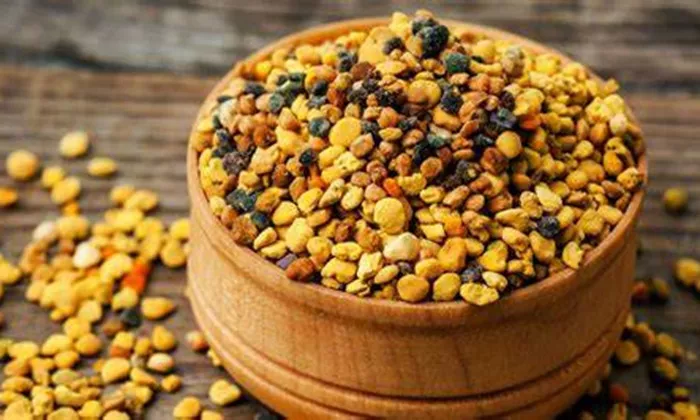Bee pollen, a blend of pollen, honeybee secretions, and nectar, has been utilized as a natural remedy for centuries. Renowned for its potential health benefits, bee pollen is rich in amino acids, vitamins, minerals, and antioxidants. Research indicates that it may alleviate hormonal symptoms in breast cancer patients and improve prostatitis symptoms, although further studies are necessary to fully understand its effects on human health.
Potential Health Benefits
1. Hormone Regulation
Research indicates that bee pollen might alleviate menopausal symptoms. In a study involving 46 women with breast cancer undergoing antihormonal treatment, participants who consumed one tablespoon of a bee pollen and honey mixture daily for 14 days reported a decrease in hot flashes compared to their baseline symptoms.
2. Rich in Antioxidants
Bee pollen is loaded with antioxidants, including flavonoids and carotenoids, which combat oxidative stress caused by free radicals. This oxidative stress is linked to chronic diseases, including certain cancers and heart disease.
3. Prostatitis Relief
A study involving 65 men with prostatitis demonstrated that three months of treatment with bee pollen capsules, combined with B vitamins, significantly reduced symptoms compared to bromelain, a known anti-inflammatory enzyme.
4. Anti-Inflammatory Properties
The anti-inflammatory compounds in bee pollen, such as flavonoids and vitamins, have shown effectiveness in reducing inflammation markers in both human and animal studies. However, additional research is needed to explore its impact on conditions like arthritis.
5. Heart Health
Animal studies suggest that bee pollen may lower heart disease risk factors, such as high cholesterol. While findings indicate a reduction of total cholesterol by up to 35% in rodents, human studies are required to confirm similar effects.
6. Antimicrobial Effects
Flavonoids and phenolic acids present in bee pollen may combat harmful bacteria and fungi, potentially aiding in oral health by reducing gum inflammation.
7. Uric Acid Reduction
Some studies indicate that bee pollen may lower uric acid levels by inhibiting specific enzymes involved in purine metabolism, potentially alleviating symptoms associated with high uric acid levels.
8. Immune Support
The antioxidant and anti-inflammatory properties of bee pollen, combined with its nutrient profile, may enhance immune function, supporting the body’s defense against infections.
9. Brain Health
While the precise effects on cognitive health remain unclear, animal studies suggest that bee pollen’s antioxidants may improve memory and protect against cognitive decline.
10. Nutrient Density
Bee pollen is packed with essential vitamins and minerals. A two-tablespoon serving contains 16% of the Daily Value (DV) for vitamin C and 12% for iron, vital for immune function and energy production.
11. Metabolic Health
Animal studies suggest that bee pollen may enhance metabolic health by lowering blood sugar and improving pancreatic function, which regulates insulin release.
12. Liver Health
Although human studies are lacking, rodent research indicates that bee pollen may reduce fat accumulation in the liver and support overall liver health.
Nutritional Profile
Typically consumed in small amounts, bee pollen remains a nutrient-dense food. A two-tablespoon serving provides approximately:
- Calories: 96
- Fat: 1.44 g
- Carbohydrates: 13.08 g
- Fiber: 2.4 g
- Protein: 7.2 g
- Vitamin C: 14.4 mg (16% DV)
- Iron: 2.16 mg (12% DV)
While bee pollen is high in protein and provides various essential nutrients, it is often consumed in smaller amounts, limiting its nutritional benefits.
Risks and Considerations
Bee pollen is generally regarded as safe when taken appropriately for short durations. However, pregnant individuals should avoid it due to potential uterine stimulation. Its safety during breastfeeding remains unconfirmed. Those with allergies to pollen or bee products should also steer clear, as severe allergic reactions may occur. In rare instances, bee pollen may lead to serious side effects, including acute hepatitis or kidney failure. Consultation with a healthcare provider is advisable before incorporating bee pollen into your diet.
Incorporating Bee Pollen into Your Diet
Bee pollen’s sweet, floral flavor allows for versatile use in various foods and beverages, including:
- Sprinkling on yogurt or oatmeal
- Mixing into coffee, tea, or smoothies
- Adding to salads and grain bowls
- Using in dressings or marinades
- Incorporating into baked goods like breads and muffins
Conclusion
Bee pollen, a nutrient-rich mixture, may offer several health benefits, including anti-inflammatory properties and potential support for hormone regulation. Although current research on its health effects is limited, many individuals find it beneficial when included as part of a balanced diet. However, bee pollen is not suitable for everyone, particularly those with specific allergies or those who are pregnant or breastfeeding.
Related Topics
What Are The Most Important Vitamins And Minerals?
































